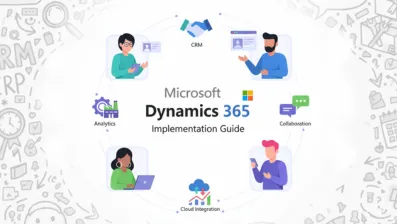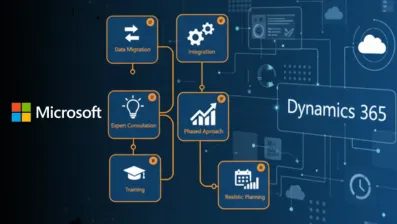Did you know that companies using advanced CRM systems see up to 29% higher sales and 42% better forecasting accuracy? That’s huge, and it’s exactly where Microsoft Dynamics 365 for Sales steps in.
In today’s fast-paced, customer-driven world, your sales team needs more than spreadsheets and outdated tools.
They need insights, automation, and a complete view of every customer interaction. Microsoft’s cloud-based platform brings it all together, helping you track leads, close deals faster, and build lasting customer relationships.
If your sales process feels stuck or disconnected, this could be the tool that changes everything.
Let’s explore how it works and why it’s become a game-changer for businesses of all sizes.
Overview of Microsoft Dynamics 365 for Sales
So, what is Microsoft Dynamics 365 for Sales exactly?
Think of it as your all-in-one sales assistant — part CRM, part analytics application, and part personal assistant. It helps you manage each phase of the sales cycle, from initial lead generation to the post-sale relationship, all in one platform.
With Microsoft D365 Sales, tracking each customer interaction, getting real-time visibility into your pipeline, and using predictive intelligence to determine which leads may convert to sales, is all easy to do.
It integrates with Microsoft products like Outlook, Teams, and Excel to ensure you can maintain a seamless workflow.
In short, Microsoft Dynamics 365 CRM for Sales gives your team the visibility, structure, and automation to focus on what matters: selling smarter and building better customer relationships.
Key Features of Microsoft Dynamics 365 for Sales
Before diving into Dynamics 365 Implementation, it’s essential to understand its features in detail. Knowing what each capability offers will help you make the most of the platform, streamline your sales processes, and ensure a smooth, results-driven implementation journey from day one.
1. Lead and Opportunity Management
Easily capture, track, and prioritize leads using smart scoring and automation.
Microsoft Dynamics 365 for Sales ensures no opportunity slips through the cracks by helping your team focus on the most promising prospects and guiding them efficiently through the entire sales cycle.
2. AI-Driven Insights
Leverage Microsoft Dynamics 365 AI for sales to predict deal outcomes, identify risks, and get actionable suggestions.
The system analyzes past interactions and buyer behaviors to offer personalized insights, helping sales teams make smarter, data-backed decisions that close deals faster and boost overall performance.
3. Sales Forecasting and Analytics
Access real-time dashboards that simplify sales forecasting and performance tracking.
Visual analytics make it easy to understand trends, measure team effectiveness, and anticipate revenue changes, empowering you to plan proactively and make strategic decisions that strengthen your sales outcomes.
4. Seamless Integration with Microsoft 365
Work smarter with tools you already know.
Microsoft Dynamics 365 for Sales integrates perfectly with Outlook, Excel, and Teams, allowing effortless data sharing, communication, and scheduling, all within one connected ecosystem that enhances collaboration and productivity across your organization.
5. Customer Relationship Management (CRM)
Build deeper customer relationships through detailed insights and history tracking.
This CRM functionality helps you personalize communication, monitor buying behavior, and maintain strong engagement across every touchpoint, ensuring consistent customer satisfaction and loyalty throughout their entire journey with your business.
6. Mobile Accessibility
Stay connected wherever you are.
The mobile app enables sales reps to access client information, update opportunities, and collaborate with teammates on the go.
With real-time synchronization, your sales team remains productive, responsive, and informed, even when away from their desks.
7. Sales Collaboration Tools
Break silos with built-in collaboration features that keep your entire team aligned.
From sharing notes and insights to managing tasks together, Dynamics 365 fosters teamwork by connecting salespeople in one unified workspace, boosting transparency and accelerating deal progress across departments.
8. Customizable Dashboards
Every business has unique sales goals. Dynamics 365 offers fully customizable dashboards and reports so you can track metrics that matter most.
Whether it’s pipeline growth, lead conversion, or revenue trends, tailor your view for real-time, relevant, and actionable sales insights.
9. Relationship Intelligence
Get a complete understanding of every customer interaction with automated data collection from emails, meetings, and calls. Relationship intelligence reveals engagement strength, identifies at-risk accounts, and helps your team nurture the right clients at the right time with meaningful communication.
10. Performance Management
Track individual and team performance through clear KPIs and goal-setting tools.
Dynamics 365 lets you monitor sales activities, identify top performers, and uncover areas for improvement, turning data into motivation that drives accountability, consistency, and long-term sales success.
With that being said, let’s explore the key benefits of implementing Dynamics 365 for Sales and how it can redefine your sales performance.
Benefits of Implementing Dynamics 365 for Sales
Now that you’ve explored the features, let’s talk about the why.
Why are so many growing businesses and established enterprises investing in Dynamics 365 Implementation?
Because it doesn’t just make selling easier, it transforms how your team connects, engages, and wins.
From deeper insights to smarter automation, Microsoft Dynamics 365 for Sales isn’t just a tool; it’s a competitive advantage that turns every sales opportunity into a relationship-driven success story.
Let’s dive into the key benefits that make this platform a true game-changer.
1] Smarter Selling with AI Integration
Imagine having a digital assistant that understands your customers better than anyone on your team.
That’s what Microsoft Dynamics 365 AI for Sales brings to the table.
It helps you predict which leads are most likely to convert, recommends the next best actions, and identifies potential risks early on.
Your team gains access to real-time insights, personalized suggestions, and automated reports, eliminating the guesswork.
With AI-powered analytics, sellers can focus on meaningful interactions rather than manual data entry. The result? Faster deals, improved productivity, and sales decisions rooted in intelligence, not intuition.
2] Streamlined Operations with Centralized CRM
When it comes to managing leads, contacts, and opportunities, Microsoft Dynamics 365 CRM for Sales keeps everything organized and connected.
It centralizes your data, automates repetitive tasks, and ensures that your entire team stays aligned at every sales stage.
Instead of juggling between tools or losing track of client interactions, your reps can view every engagement, note, and deal history in one place.
The CRM’s unified interface promotes transparency, collaboration, and customer focus.
It empowers your sales team to act faster, nurture relationships better, and close more deals, all while delivering exceptional customer experiences.
3] Enhanced Collaboration and Team Alignment
Sales success is rarely a solo effort. With Microsoft Dynamics 365 Customer Engagement for Sales Teams, collaboration becomes effortless.
Teams can share insights, coordinate follow-ups, and access unified communication tools without switching platforms.
Whether it’s sharing updates via Teams or tracking discussions in real time, your entire organization stays connected.
Managers gain visibility into team performance, while reps receive the guidance and support they need to stay on track.
This seamless collaboration strengthens trust, improves responsiveness, and ensures that every customer touchpoint feels consistent and well-coordinated, the secret ingredient to long-term business relationships.
4] Personalized Customer Experiences
Today’s buyers expect more than a pitch; they want meaningful connections.
Dynamics 365 for Sales helps you personalize every interaction using data-driven insights. From tracking communication preferences to analyzing buying patterns, your sales reps can tailor their outreach to each customer’s unique journey.
The result is more authentic engagement and stronger trust. Customers feel understood and valued, leading to repeat business and long-term loyalty.
With tools that prioritize human connection, Dynamics 365 ensures that your sales strategy focuses not just on closing deals, but on building relationships that last.
5] Improved Forecasting and Decision-Making
With Dynamics 365’s advanced analytics and forecasting tools, you can plan smarter and act faster.
The system aggregates sales data, identifies trends, and visualizes performance across teams and regions.
Managers can spot opportunities early, address potential gaps, and make data-backed decisions that improve revenue accuracy.
This level of clarity reduces uncertainty and boosts confidence in every strategic move.
Whether it’s optimizing pipelines or reallocating resources, Dynamics 365 transforms data into a competitive advantage, empowering your business to stay proactive rather than reactive in an ever-changing sales environment.
Now that you understand the core features and benefits, it’s time to put them into action.
The Role of Dynamics 365 for Sales in Driving Business Growth
The Role of Dynamics 365 for Sales goes far beyond managing leads or tracking deals — it’s about transforming your entire sales ecosystem. With automation, AI, and real-time insights, the platform helps you sell smarter, respond faster, and build lasting customer connections.
Let’s break down the key roles that Microsoft D365 Sales plays in empowering your business growth.
A] Centralizing Customer Data
One of the biggest strengths of Microsoft Dynamics 365 for Sales is its ability to centralize all customer information in one unified space.
Instead of scattered spreadsheets or disconnected systems, you get a single source of truth.
This makes it easier for your sales team to understand customer behavior, track history, and personalize every interaction effectively.
B] Enhancing Sales Productivity
With smart automation and intuitive workflows, Dynamics 365 for Sales takes repetitive tasks off your team’s plate.
From lead assignments to follow-up reminders, everything runs automatically.
That means your sales reps spend less time entering data and more time doing what truly matters, closing deals and engaging customers.
C] Delivering Actionable Insights
Microsoft Dynamics 365 for Sales leverages AI-driven analytics to turn your sales data into actionable insights.
You can easily identify trends, forecast revenue, and predict customer needs before they arise.
These insights empower decision-makers to refine strategies, set realistic goals, and continuously improve team performance with confidence.
D] Improving Customer Engagement
Today’s customers expect personalized attention. Microsoft D365 Sales helps you deliver it seamlessly.
By tracking preferences, communication history, and purchase patterns, you can tailor your messages for better engagement.
Every email, call, or meeting becomes more relevant — building trust and long-term relationships that go beyond a single transaction.
E] Streamlining Team Collaboration
Sales doesn’t happen in isolation. With built-in tools that integrate with Outlook, Teams, and SharePoint, Dynamics 365 for Sales keeps everyone on the same page.
Teams can share insights, coordinate deals, and collaborate effortlessly, ensuring that no opportunity is missed and every client interaction feels cohesive and consistent.
F] Boosting Forecast Accuracy
Forecasting becomes much simpler with Microsoft Dynamics 365 for Sales.
Real-time analytics and pipeline tracking let you see where deals stand, identify risks early, and make data-backed predictions.
Accurate forecasts help your business plan better, manage resources efficiently, and maintain a steady revenue flow without last-minute surprises.
G] Supporting Scalable Growth
As your business expands, Microsoft D365 Sales grows with you. Whether you’re adding new team members, entering new markets, or scaling operations, the platform adapts easily. Its modular design and flexible integrations ensure your CRM remains aligned with evolving business needs — supporting sustainable, long-term growth.
Knowing what Dynamics 365 for Sales can do is one thing, but learning how to implement it effectively is where the transformation really begins.
How to Implement Microsoft Dynamics 365 for Sales?
Implementing a new CRM solution can feel overwhelming at first, but with the right strategy and structure, it becomes a smooth and rewarding journey.
Whether you’re upgrading your sales tools or starting fresh, these steps will guide you through a successful Microsoft D365 Sales implementation that fits your business goals perfectly.
Let’s get to know them:
Step 1: Define Your Goals and Objectives
Before you dive into configuration or setup, start by defining why you’re implementing Microsoft Dynamics 365 for Sales in the first place.
Are you trying to shorten your sales cycle? Improve customer engagement? Increase deal conversion rates?
Clarity at this stage is crucial. Once you outline your objectives, align them with measurable KPIs like lead response time, customer retention, or sales growth.
This helps ensure your implementation strategy is tailored to real business outcomes. Think of this step as setting the GPS before a road trip, it ensures everyone knows the destination before the journey begins.
Step 2: Choose the Right Microsoft Dynamics 365 for Sales Version
Microsoft offers different editions each designed for specific needs and budgets.
If your business focuses on streamlining essential sales processes, the Professional version may be a perfect fit.
However, if you require advanced customization, AI-driven insights, and integrations with ERP or marketing modules, the Enterprise edition is more suitable.
Choosing the right version early prevents future limitations. Evaluate your sales team’s requirements, size, and workflow complexity.
Remember, Dynamics 365 is scalable, you can always expand as your organization grows, but starting with the right foundation makes all the difference.
Step 3: Map and Cleanse Your Data
Before importing existing data into your new system, take time to clean, structure, and organize it. This is one of the most overlooked but critical steps in any Dynamics 365 for Sales implementation.
Remove duplicate contacts, update missing information, and ensure that every lead, account, and opportunity is accurate. Data integrity is the backbone of your CRM, poor data leads to poor insights.
Once cleansed, structure your data so that it aligns with the fields and workflows in Microsoft Dynamics 365 CRM for Sales.
Clean data not only boosts efficiency but also enhances your team’s confidence in using the new system from day one.
Step 4: Configure and Customize Your System
This is where Microsoft D365 Sales truly becomes your platform. Tailor it to fit your sales processes, pipeline stages, and reporting needs. You can create custom fields, automate follow-up reminders, and configure workflows that mirror your real-world operations.
Leverage out-of-the-box templates for quick setup, or integrate tools like Outlook and Teams for seamless communication. Dynamics 365’s flexibility allows you to create dashboards and views that make sense for your team.
Customization ensures your CRM feels natural to use, not forced. The more intuitive the system, the faster your sales reps will adopt it, which means quicker ROI and smoother daily operations.
Step 5: Train Your Sales Team and Encourage Adoption
Even the most powerful CRM won’t deliver results if your team doesn’t know how to use it effectively. Training is key.
Host onboarding sessions to walk your team through the basics of what Microsoft Dynamics 365 for Sales is, from managing leads to tracking opportunities.
Provide role-based training so each department learns what matters most to them. Encourage hands-on practice with real scenarios.
When users see how Dynamics 365 makes their day easier, from automated task reminders to AI insights, adoption naturally increases.
Remember, people don’t resist technology; they resist confusion. Proper training bridges that gap.
Step 6: Monitor, Optimize, and Scale
Once your implementation is live, the journey doesn’t end – it evolves. Use built-in reporting tools in Microsoft Dynamics 365 for Sales to track performance metrics and user engagement.
Identify bottlenecks, gather feedback from your sales team, and fine-tune workflows regularly.
The flexibility of Dynamics 365 lets you add features, connect with other Microsoft apps, and scale effortlessly as your business grows.
Continuous monitoring and optimization ensure your CRM keeps delivering value long after launch.
With the right strategy, Dynamics 365 becomes more than a sales tool, iit becomes a growth engine for your entire organization.
So, this is the process to implement Dynamics 365 for sales. Now, with that, we will talk about cost.
Cost of Implementing Microsoft Dynamics 365 for Sales
When planning your CRM journey, understanding the cost to implement Dynamics 365 is crucial.
Pricing can vary depending on your business size, feature requirements, user licenses, and level of customization.
While smaller teams may start with basic packages, enterprises often opt for advanced integrations and automation.
The table below provides a general overview of potential implementation costs to help you estimate your investment wisely.
Implementation Component | Description | Estimated Cost Range (USD) |
License Fees | Monthly user-based subscriptions for Dynamics 365 plans. | $65 – $135 per user/month |
Setup & Configuration | Basic system setup, data mapping, and workflow design. | $3,000 – $8,000 |
Customization & Integration | Custom dashboards, automation, and third-party integrations. | $5,000 – $15,000 |
Data Migration | Transferring existing data to Microsoft Dynamics 365 for Sales. | $2,000 – $6,000 |
User Training | Onboarding sessions and hands-on workshops for teams. | $1,000 – $3,000 |
Support & Maintenance | Ongoing updates, technical support, and system optimization. | $1,500 – $5,000 annually |
The cost of implementing may vary based on the enterprise needs, but by working with a trustworthy Microsoft app development company, you could effectively manage your costs, develop your requirements in a tailored manner, and achieve the best return on investment from your CRM.
Use Cases of Dynamics 365 for Sales
Dynamics 365 for Sales isn’t just another CRM, it’s a strategic sales powerhouse designed to fit diverse business needs.
From lead nurturing to performance tracking, it helps companies overcome common Microsoft Dynamics challenges while streamlining operations, improving collaboration, and enhancing customer experiences.
Let’s explore some of the most impactful use cases where Microsoft Dynamics 365 for Sales proves its value in real-world business scenarios.
1. Lead Management and Conversion
With Microsoft D365 Sales, businesses can easily capture, track, and prioritize leads from multiple channels. Automated scoring helps identify the hottest prospects, while personalized communication boosts conversion rates. The result? A smoother, smarter sales pipeline that consistently turns potential customers into loyal buyers.
2. Customer Relationship Building
Microsoft Dynamics 365 for Sales helps you go beyond transactions to build long-term relationships. By tracking every customer touchpoint, your sales team gains a 360-degree view of buyer behavior. This enables tailored communication and proactive engagement — key factors in building loyalty and trust over time.
3. Sales Forecasting and Planning
Accurate forecasting is vital for smart decision-making. Dynamics 365 for Sales empowers managers with data-driven insights, real-time analytics, and predictive tools to forecast sales outcomes precisely. Teams can align strategies, allocate resources effectively, and respond quickly to changing market conditions, driving consistent growth.
4. Performance Monitoring and Coaching
Tracking team performance becomes effortless with Microsoft Dynamics 365 for Sales. Managers can view dashboards, monitor KPIs, and identify skill gaps instantly. This allows for timely feedback and personalized coaching, helping every rep improve their productivity and hit targets more effectively.
5. Seamless Integration and Collaboration
One of the biggest Microsoft Dynamics challenges is ensuring system harmony across departments. Dynamics 365 solves this by integrating effortlessly with Outlook, Teams, and Power BI. Your teams can collaborate in real time, share insights, and work together without switching between multiple apps.
6. Personalized Customer Engagement
With Microsoft D365 Sales, personalization becomes second nature. AI-driven insights help sales reps send the right message to the right person at the right time. From personalized offers to follow-ups, every interaction feels relevant — creating stronger connections and higher customer satisfaction.
7. Global Sales Operations Management
For enterprises managing teams across countries, Dynamics 365 for Sales provides unified visibility. You can track regional performance, standardize processes, and maintain brand consistency globally. It simplifies coordination and ensures every team, no matter where they are, operates under one efficient, data-driven system.
How DotStark Can Help You Implement Microsoft Dynamics 365 for Sales?
Implementing a solution as powerful as Dynamics 365 for Sales can be a game-changer — but only if you do it right.
That’s where DotStark comes in. We are a top Microsoft Dynamics 365 consulting company that works with you to help get your business using the full potential of Microsoft's ecosystem of sales Software.
We understand your organization is going to have different workflows, customer journeys, and sales goals.
So we start with an assessment of what existing systems you are using, a mapping of requirements, then build a tailored deployment plan to maximize ROI of the investment.
DotStark does it all — data migration, customizing, training employees and supporting the post-launch implementation stage.
Whether you are a small startup or enterprise level company, DotStark will help make sure your Dynamics 365 solutions fits your sales method and direction with ease.
We will enable your sales team not just implement new software, but help them become a new smarter more connected, and performance-driven sales unit.
Conclusion
Microsoft Dynamics 365 for Sales isn’t just another CRM solution, it’s a complete sales transformation engine.
From improving customer engagement to empowering your sales teams with AI-driven insights, it bridges the gap between strategy and execution.
The platform simplifies sales operations, enhances collaboration, and provides real-time visibility into every opportunity. Whether you want to streamline your pipeline or boost conversions, Dynamics 365 helps you achieve it all with ease.
However, successful adoption goes beyond installation, it requires the right strategy, customization, and guidance.
That’s where DotStark comes in. With our deep expertise in Microsoft technologies, we ensure your Dynamics 365 implementation drives measurable results and long-term value.
If you’re ready to accelerate growth, enhance productivity, and make smarter sales decisions, now’s the time to embrace the future of connected selling with Dynamics 365 and DotStark by your side.
Frequently Asked Questions
Microsoft Dynamics 365 for Sales is a cloud-based CRM solution designed to help businesses manage leads, close deals faster, and build stronger customer relationships. It streamlines sales processes, provides AI-driven insights, and integrates with tools like Outlook and Teams for a seamless, productivity-focused experience.
The implementation time varies depending on the complexity of your requirements. For small businesses, it can take 4–6 weeks, while larger enterprises may require 3–6 months. Factors like customization, data migration, and training also influence the total project duration.
The cost to implement Dynamics 365 depends on user licenses, customization, and business scale. On average, small implementations start around $10,000, while enterprise-level projects can range from $30,000 to $100,000. Working with an experienced implementation partner helps optimize costs and ROI.
Key benefits include improved sales forecasting, smarter decision-making with AI insights, streamlined workflows, and stronger collaboration through Microsoft 365 integration. It empowers sales teams to focus on building relationships rather than managing manual data, increasing overall efficiency and revenue growth.
DotStark is a trusted consulting company with proven expertise in CRM deployment, customization, and post-launch support. We tailor every solution to match your business goals, ensuring a smooth implementation that maximizes your sales performance and long-term business value.

.webp)



.webp)

.webp)

.webp)

.webp)
.webp)

-(1).webp)

.webp)
.webp)


 +91 9680599916
+91 9680599916
 vanshika@dotstark.com
vanshika@dotstark.com
